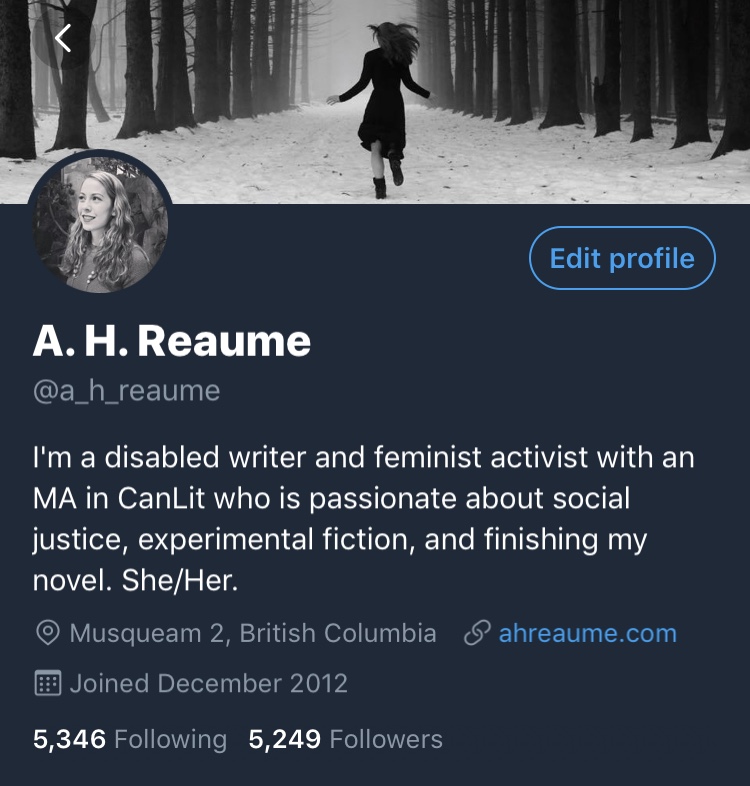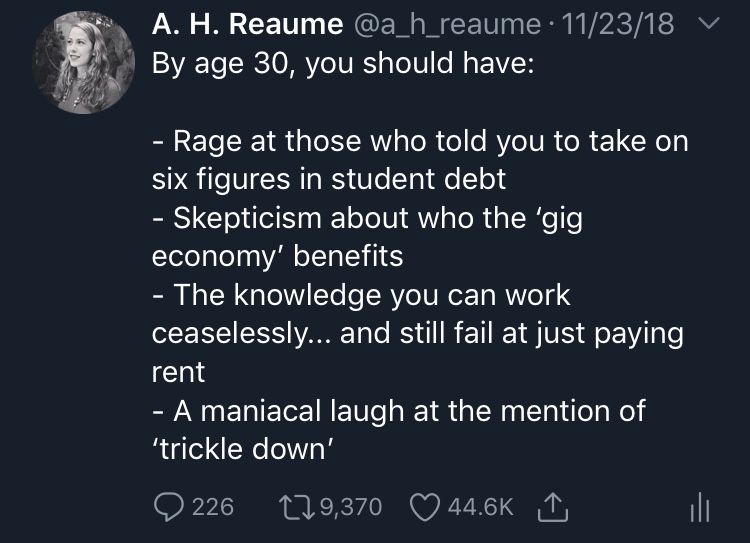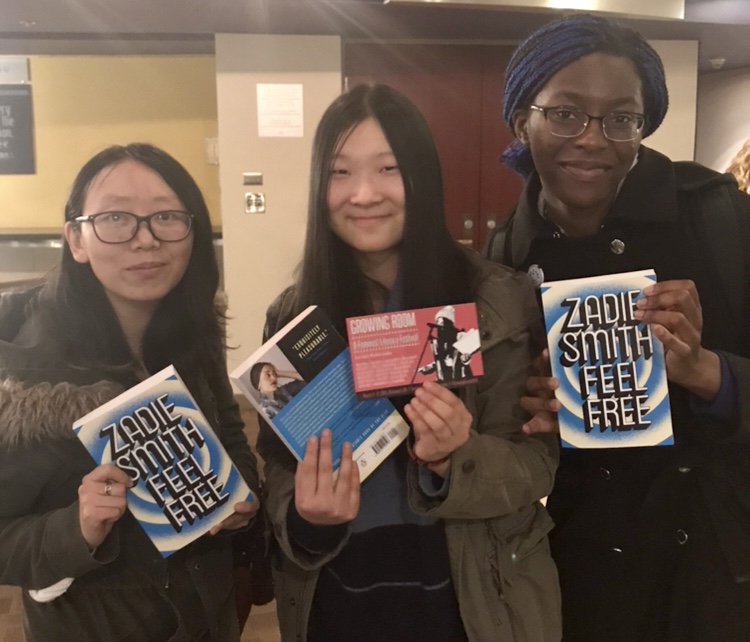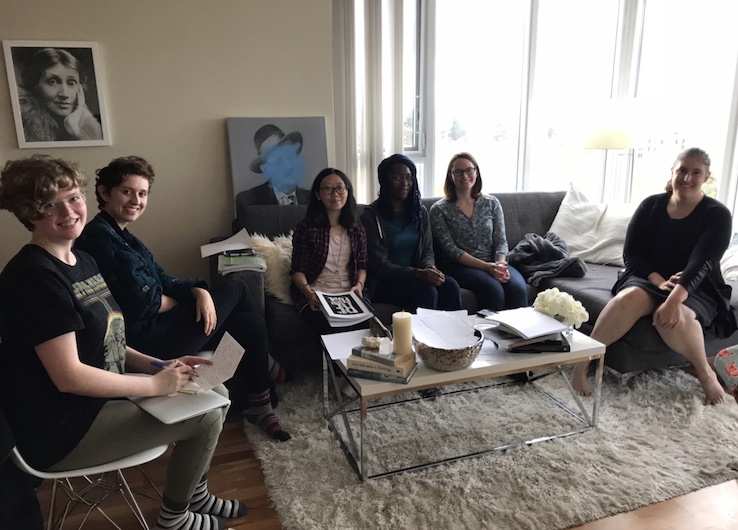How Twitter Transformed My Writing Life
By A.H. Reaume
“Ugh, I’m on Twitter and I hate it,” I remember telling a friend and fellow writer at her birthday party last year.
The room was full of writers and the conversation had somehow shifted to talk about Twitter. While I’d dutifully created an account on the website years ago to promote my freelance writing, using the site felt like a chore.
“Who do you follow?” my friend asked confused.
“I don’t know,” I told her. “A bunch of personal finance people? I just use my account to promote the financial writing I do.”
“That’s your problem,” she told me. “CanLit Twitter is pretty great. I learn so much on there – and I’ve made a lot of friends.”
This was the first that I’d heard about ‘CanLit’ Twitter. I didn’t realize that there were distinct Twitter communities and that you could make offline friends through Twitter. Wasn’t Twitter just everyone getting mad at each other and fighting?
It didn’t seem like an appealing way to spend my time—especially since I was recovering from a brain injury and had to limit my screen time. Was Twitter ‘screen worthy’ given the precious few hours a day I could be on my phone? I wondered.
Still, I was curious—so on February 9th, 2018 I logged into an account I created in 2012 and used only once previous--to tweet at Kathy Griffin and Anderson Cooper on New Year’s Eve hoping they would put a shoutout to my boyfriend at the time on the air (should I be embarrassed about this? I don’t know. I’m keeping it in this essay for the sake of ‘colour’).
I substituted the egg picture for a headshot and updated the banner and handle. Then I sent out my first tweet—a quote by Kateri Akiwenzie-Damm from an event I went to titled "Publishing Unbound."
“People have been saying that Indigenous writers should get together and start their own press. But Kegedonce Press has been around since 1993. Support us.” - Kateri #PublishingUnbound
Your CanLit News
Subscribe to Open Book’s newsletter to get local book events, literary content, writing tips, and more in your inbox
That was the beginning of my Twitter story. Oh, what a difference a year makes!
Finding Community
Before I joined Twitter, I wasn’t close friends with a lot of writers. I didn’t even know very many in my city. I wanted to go to readings, but I never heard about them and was afraid I wouldn’t know anyone at them.
This lack of community made me feel isolated prior to my head injury in May 2017, and this isolation only increased afterwards since I could rarely meet up with the writer friends I had because I was often confined by fatigue to my home.
When I saw my friend at her party in early February, my health was gradually improving and I figured that soon I would be back to my normal self and able to focus again on finding a writing community.
But that wasn’t the case. Instead, I had a huge setback in March which saw me spend almost every moment I wasn’t at work that month stuck in bed due to extreme fatigue.
I’d been rebuilding my life on what I thought was a steadying foundation, but suddenly my body became a sink hole and all my plans fell into it.
As I lay isolated in bed, I tweeted. And tweeted. Then tweeted some more. I saw Twitter as a way to speak out on issues that I felt I no longer had a voice on given that I was housebound. And tweeting and connecting with other writers online made me feel less alone.
Given that I tend to be long-winded, I wasn’t good at single tweets. I quickly realized that my tweeting forte was Twitter threads and started writing them—about disability issues, about books, and about the Steven Galloway case.
My first thread to get widely liked and shared featured a link to an op-ed that I wrote for the Globe and Mail about the Patrick Brown case. It talked about my experiences at UBC as the founder of a feminist magazine and how in that position I heard a lot of allegations around sexual assault and harassment in politics and by profs.
I was shocked when a lot of people shared the post, liked it, commented, and followed me. I saw my follower count go up and got messages from people telling me how much they appreciated me writing about this issue. I felt like I was once again doing important activist work.
Twitter gave me a voice to talk about issues that mattered to me and people were listening and appreciating what I had to say. I often wished I could write essays about the issues I tweeted about, but it wasn’t something I could do at the time. I couldn’t spend enough time on a screen to write an in-depth piece. But a Twitter thread was the perfect medium even if sometimes I had to write my threads tweet by tweet – pausing after every 240 characters to rest my eyes.
Being part of the Twitter community gave me the confidence and motivation to finally start working on my novel again, which I’d set aside because I was overwhelmed with my recovery. I saw so many Twitter friends making progress on their projects and it motivated me to get back to seriously working on mine. That required that I hire a friend to help me accommodate my disability – something that the disabled friends I made on Twitter inspired me to do.
Ongoing Learning Opportunities
I’ve learned so much from reading the threads of other writers. Since my injury, I’ve barely read the news since long articles tend to be more than I can absorb at once without printing them out. But tweets and Twitter threads are the perfect length for me.
One of the benefits of Twitter is that it allows people who are marginalized to speak out and share their point of view. I was reading threads from Indigenous writers, and disabled queer writers, and trans writers of colour, and people from all backgrounds on issues that would likely never have gotten green-lit for an article in a mainstream publication.
In the last year alone, I have learned so much about how I can be a better ally to many groups and fellow writers. I’m still learning how to a better ally and I love that Twitter gives me that chance.
Meaningful Friendships with Other Writers
As a disabled writer, I was also able to use the platform to talk about being disabled, about my health struggles, and about the ableism that I was experiencing. I was able to connect with other writers with head injuries and other disabled writers. I’ve developed meaningful friendships with many of them and we support each other through our health struggles via DMs. It helps to have someone who understands how hard it can be to write through disability.
I’ve also been able to connect with a number of local writers via Twitter who have become close friends. People like the young writer Isabella Wang, and writer and activist Yilin Wang, for example, have had a huge impact on my life and are two of my closest and dearest friends. It’s been an honour to help support Yilin in the work she’s done to talk about racism in CanLit and to write silly tweets about things like hamsters whenever Isabella hangs out at my house. I also often talk with people who don’t live in my city like CanLit funder Rahim Ladha, and writers Alicia Elliott, and Ashley Hynd about writing and life. These are all people I only know because of Twitter and who add immeasurable joy and comfort to my life.
I have so many friends in other cities that I’ve met through Twitter – some who I text with daily and with whom I carry on stimulating discussions. When I go to another city, there are often a bunch of Twitter friends who would like to meet up with me to talk about writing or just hang out and this has led to writing collaborations. When I was in Toronto recently, I met up with Erin Soros and plotted a collaborative writing project, for example. Writer friends who live in other cities have come to visit Vancouver and stayed at my house as well. We’ve talked about our writing, but we’ve also just had a lot of fun.
When I go to literary events these days, people often recognize me from Twitter. “Are you A. H.?” they ask. They often will tell me how much something I posted about meant to them or compliment me on my writing (they often mention this piece I wrote for Open Book). I no longer feel like I lack a writing community.
Twitter Helped Me Professionally – But That’s Not Why I’m On Twitter
While I never joined Twitter for professional opportunities and that’s not the primary reason I tweet, I’ve gotten a number of professional opportunities that I wouldn’t otherwise have gotten by being on the site. For example, I was asked to submit to the Refuse: CanLit in Ruins anthology, I got the opportunity to write as a columnist for Open Book and I’ve had literary journals solicit essays from me.
I also love that I can use Twitter to promote and talk about the work of my friends and other amazing writers. Now that I have over 5,000 followers, retweeting a friend’s tweet often gets them more exposure and followers. This is part of the reason that I do a monthly round-up of the books I read. I love to give shoutouts to the great work my writer friends are doing.
About those 5,000 followers – I’ve had a few tweets go viral which has boosted my follower count higher than I ever expected it to be after a year on the site. I’m also really open on Twitter about my struggles and what I’m experiencing as a disabled woman and writer, and while this strategy isn’t right for everyone—it works for me.
I tend to get the most likes and follows on threads where I make myself vulnerable and share something personal. I often share these threads to help me process experiences like facing ableism while dating but others connect and identify with them. Often, I get private messages from people telling me how much what I’ve tweeted about has meant to them because they can’t be open about their disabilities online or they still feel shame about the experience I’m talking about.
You hear a lot about how Twitter is a soulless place where no one actually connects with anyone. I know this is true in some corners of the site. However, I’ve found that Twitter is a great place to meet likeminded writers and build meaningful online and offline relationships with them. It’s also a great place to promote offline activism or to generate activist communities that can take action on issues. I’ve been part of organizing fundraising campaigns to support defendants in the Steven Galloway lawsuit, for example. As a professional fundraiser, I’ve also used my skills to fundraise for various literary causes on Twitter.
Twitter Changed My Life
Twitter friendships have changed and enriched my life in a multitude of important ways. Not a day goes by when I don’t have an interaction that is deeply meaningful to me and that was made possible by Twitter.
While some writers might say that Twitter wastes time that you could be using writing, I don’t find that my use of Twitter takes away from my writing time. I mostly write tweets while slowly waking up in the morning or between sets while I workout at the gym. I respond to tweets while waiting in line at the store or waiting for my dinner to cook. I find ways to fit Twitter into my life -- I don’t let it take over my life.
When I look back at this past year, I can’t imagine what it would have looked like if I hadn’t had that conversation with my friend last February. I likely wouldn’t have joined Twitter and I wouldn’t have met so many amazing writers across Canada. My life would be smaller than it is today. It wouldn’t have been filled with so many moments of connection and joy during a time when I often felt very isolated because of my health. My career as a writer also wouldn’t have advanced as much as it did in the last year, either. I likely wouldn’t be done the manuscript of my novel and preparing to send it out to agents.
So, thank you to all those who are part of my Canlit Twitter community. Thank you for welcoming me and becoming my friend. Thank you for everything I’ve learned from your tweets and for the friendship that we’ve shared—both online and offline. It has mattered more deeply to me than you’ll probably ever know.
The views expressed by Open Book columnists are those held by the authors and do not necessarily reflect the views of Open Book.
A.H. Reaume is a Vancouver-based fiction writer who reads too much and is currently in too many book clubs (four in total). Reaume has a background in feminist activism and an M.A. in Canadian Literature from UBC. She's been published in the Vancouver Sun, The Globe and Mail, USAToday.com, and Time.com and is currently trying to finish her first novel.








